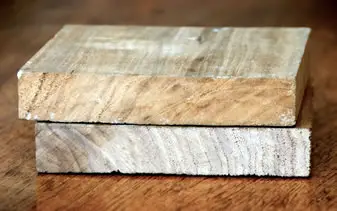Exceedingly stupid.
As thick as two short planks
What's the meaning of the phrase 'As thick as two short planks'?
What's the origin of the phrase 'As thick as two short planks'?
‘Thick’ has been used to mean slow-witted or stupid since the turn of the 17th century. Shakespeare used it to good effect in Henry IV, Part. 2, 1600:
Hang him baboon, his wit’s as thicke as Tewksbury mustard.
Tewksbury mustard was a variety that was made in the Gloucestershire town from ground English mustard seeds and horseradish, formed into a ball. It was thick and creamy, in fact it still is and is available in Tewksbury and elsewhere in the UK.
Most of the ‘as X as Y’ similes refer to some item (Y) and precede it with some property (X) that Y is well-known to posses. Here ‘thick’ does double duty. It refers to the obvious lack of wit that a piece of wood would display and also to another meaning of thick, that is, ‘short and wide’. Planks of wood are wide and the shorted they are the greater their apparent thickness. Two short planks are even thicker.
The expression ‘as thick as two short planks’, which is sometimes given in the variant form ‘as thick as two planks’, is of UK origin and dates from the 1970s. The earliest example of it that I know of in print is in Gordon Honeycombe’s novel Adam’s Tale, 1974. Memory is fallible and plays no useful part in etymology, but I’ll mention anyway that I have a clear recollection of hearing it ‘in the wild’ earlier than that.
The phrase led to the later adoption, also in the UK, of the single word ‘plank’ to describe someone thought to be stupid.
See other ‘as x as y similes‘.
Related phrases and meanings
Browse more Phrases
About the Author

Phrases & Meanings
A-Z
A B C D E F G H I J K L M N O P Q R S T UV W XYZ
Categories
American Animals Australian Bible Body Colour Conflict Death Devil Dogs Emotions Euphemism Family Fashion Food French Horses ‘Jack’ Luck Money Military Music Names Nature Nautical Numbers Politics Religion Shakespeare Stupidity Entertainment Weather Women Work
How did we do?
Have you spotted something that needs updated on this page? We review all feedback we receive to ensure that we provide the most accurate and up to date information on phrases.
